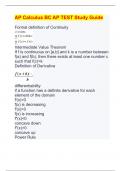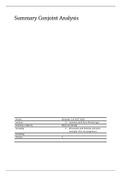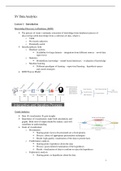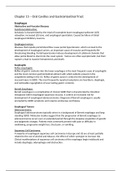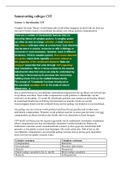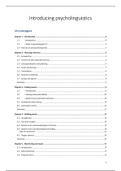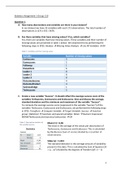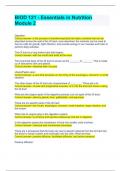Accomplice Liability/Secondary Participation
Lecture 13
In this area we are essentially looking at: If someone carries out a crime, what liability is there
for other people who were around the person?
You are an accomplice to something; nobody can ever be a singular accomplice
Context:
1. Relationship with inchoate liability?
2. Important concepts of:
a. Principal offender; and
b. Accessory
3. Law does not only punish those who directly harm victims
4. Numerous actors in a criminal enterprise can be criminalized
Who is the principal?
You must know who the primary offender is before understanding what an accomplice is
D is a principal offender if he/she completes the actus reus with the necessary mens rea.
It’s not always so easy to deftermine who a principle offender is. It is possible for more
than 1 person to be the principal offenders.
Example:
o A and B wishing to kill C follow him home. A stabs C and B then pushes him into
the river. C subsequently dies.
o Who are principals here?
They are both joint principals; they both made substantial contribution
to the offence. It’s not as though A sold B the gun knowing B was going to
kill C (like we talked about last week)
What if the prosecution cannot prove if D was the principal? (R v Giannetto [1997] 1 Cr
App R 1)
o D made threats to kill his wife and paid someone to kill her
o Prosecution could not prove if the D killed her or got someone else to do it
o It was held that it was proper that the jury could convict provided that they all
agree he was responsible either as the person that shot her or was an accessory.
o If you are held to be an accessory to a crime then you are equally as liable
Innocent agents
Person who actually causes the harm but is deemed ‘innocent’
Very narrow band of cases regarding innocent agents
Connection with novus actus interveniens i.e. a ‘free and voluntary act of a third party’
D may be liable as principal where they ‘cause’ the innocent agent to perform the actus
reus
, Dependent on the principal being unaware of the circumstances which render the
conduct criminal.
R v Stringer and Banks [1992] Crim LR 639
o Employer told employee to engage in accounting transactions and the employee
honestly believed that these were normal transaction
o The employer was guilty as the principal offender of a fraudulent transaction and
the employee was an innocent agent
o Basically: the person who causes the harm to be carried out uses an innocent
agent as an instrument for the harm to be conducted
Complicity
Often referred to as ‘secondary parties’ or ‘accessorial liability’ – depending on the
textbook you read
‘Accessorial liability is a form of derivative liability’ (Wilson)
D becomes an accomplice if he/she:
a. Aids
b. Abets
c. Counsels;
d. Procures (all these are criminalised by s.8 Accessories and Abettors Act
1861); or
e. Is party to a ‘joint enterprise’
a. This idea was once seen as a separate entity of secondary
participation but now it is no longer seen as separate (we will see
more of this when we look at the cases)
b. Joint enterprise is about two or more individual who share a
common purpose. People who aid and abet do not share that
common purpose.
Someone is an accomplice when they don’t actually complete the offence but they
contribute
o We are looking today at what that contribution is in the criminal law
S.8 makes clear that helping or encouraging someone to commit a substantive offence
constitutes the commission of that offence - why might this be justified?
o Often the case where an accomplice becomes the prosecution witness where
they might be offered a shorter jail sentence etc. if they give evidence against
the principal offender
o The accomplice’s liability does not derive from the principal offender; the
principal doesn’t even have to be identified in some cases. Liability derives from
proof of the principle offence
o Might be justified because its desirable because the prosecution could have
difficulty proving who did exactly which element of the crime and S.8 would help
their case
Lecture 13
In this area we are essentially looking at: If someone carries out a crime, what liability is there
for other people who were around the person?
You are an accomplice to something; nobody can ever be a singular accomplice
Context:
1. Relationship with inchoate liability?
2. Important concepts of:
a. Principal offender; and
b. Accessory
3. Law does not only punish those who directly harm victims
4. Numerous actors in a criminal enterprise can be criminalized
Who is the principal?
You must know who the primary offender is before understanding what an accomplice is
D is a principal offender if he/she completes the actus reus with the necessary mens rea.
It’s not always so easy to deftermine who a principle offender is. It is possible for more
than 1 person to be the principal offenders.
Example:
o A and B wishing to kill C follow him home. A stabs C and B then pushes him into
the river. C subsequently dies.
o Who are principals here?
They are both joint principals; they both made substantial contribution
to the offence. It’s not as though A sold B the gun knowing B was going to
kill C (like we talked about last week)
What if the prosecution cannot prove if D was the principal? (R v Giannetto [1997] 1 Cr
App R 1)
o D made threats to kill his wife and paid someone to kill her
o Prosecution could not prove if the D killed her or got someone else to do it
o It was held that it was proper that the jury could convict provided that they all
agree he was responsible either as the person that shot her or was an accessory.
o If you are held to be an accessory to a crime then you are equally as liable
Innocent agents
Person who actually causes the harm but is deemed ‘innocent’
Very narrow band of cases regarding innocent agents
Connection with novus actus interveniens i.e. a ‘free and voluntary act of a third party’
D may be liable as principal where they ‘cause’ the innocent agent to perform the actus
reus
, Dependent on the principal being unaware of the circumstances which render the
conduct criminal.
R v Stringer and Banks [1992] Crim LR 639
o Employer told employee to engage in accounting transactions and the employee
honestly believed that these were normal transaction
o The employer was guilty as the principal offender of a fraudulent transaction and
the employee was an innocent agent
o Basically: the person who causes the harm to be carried out uses an innocent
agent as an instrument for the harm to be conducted
Complicity
Often referred to as ‘secondary parties’ or ‘accessorial liability’ – depending on the
textbook you read
‘Accessorial liability is a form of derivative liability’ (Wilson)
D becomes an accomplice if he/she:
a. Aids
b. Abets
c. Counsels;
d. Procures (all these are criminalised by s.8 Accessories and Abettors Act
1861); or
e. Is party to a ‘joint enterprise’
a. This idea was once seen as a separate entity of secondary
participation but now it is no longer seen as separate (we will see
more of this when we look at the cases)
b. Joint enterprise is about two or more individual who share a
common purpose. People who aid and abet do not share that
common purpose.
Someone is an accomplice when they don’t actually complete the offence but they
contribute
o We are looking today at what that contribution is in the criminal law
S.8 makes clear that helping or encouraging someone to commit a substantive offence
constitutes the commission of that offence - why might this be justified?
o Often the case where an accomplice becomes the prosecution witness where
they might be offered a shorter jail sentence etc. if they give evidence against
the principal offender
o The accomplice’s liability does not derive from the principal offender; the
principal doesn’t even have to be identified in some cases. Liability derives from
proof of the principle offence
o Might be justified because its desirable because the prosecution could have
difficulty proving who did exactly which element of the crime and S.8 would help
their case

